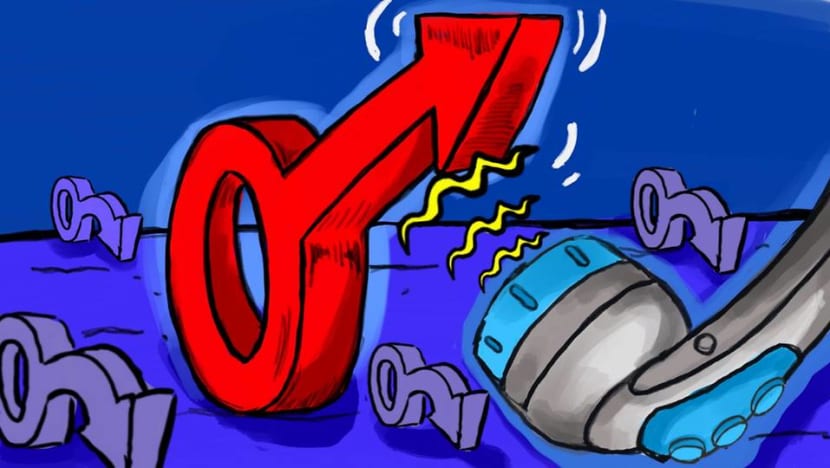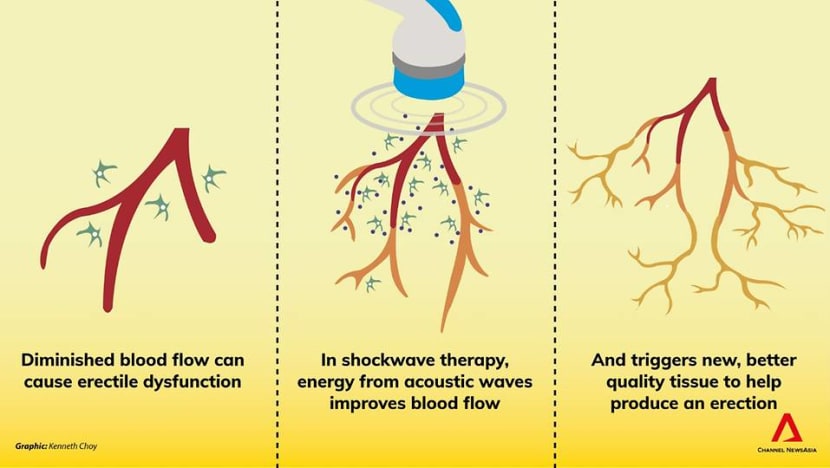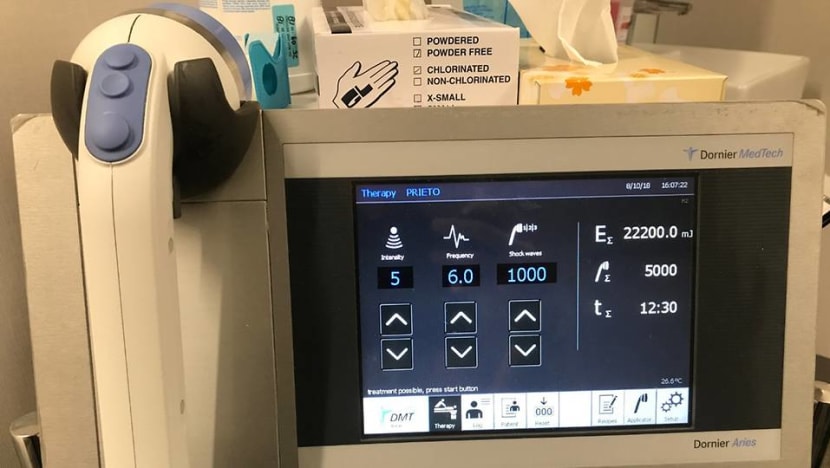The painless, potent ‘shock’ treatment for men who struggle to perform in bed
Compared to the likes of Viagra, shockwave therapy remains a less mainstream remedy for erectile dysfunction. But some doctors and patients in Singapore are warming to it.

Shockwave therapy uses low intensity acoustics emitted by a machine probe, pictured above, to help enhance the firmness of an erection (Illustration: Kenneth Choy)
SINGAPORE: "Shockwave therapy for the penis” can be an intimidating proposition, admitted Travis (not his real name), a Singaporean male in his late 30s. Yet five months ago he tried the treatment in a bid to fix his erectile dysfunction (ED) - and it worked.
“People might be put off by the word 'shockwave', but there’s nothing to be afraid of. It was painless, there was no discomfort,” he described. “And it is effective. My performance has improved … it’s much better now.”
Despite the name, shockwave therapy actually uses external, low-intensity acoustics to trigger a process that forms new blood vessels, improving blood flow to the nether regions to help enhance the firmness of an erection.
“Part of the reason for ED could be inflammation of the blood vessels or damaged tissue - and what shockwave therapy does is create better-quality tissue,” said Dr Lim Kok Bin, a urologist who has been offering the treatment at his Raffles Hospital clinic since 2016.
He added that the technology is not new, having long been used to address joint pains as well as break down kidney stones - albeit at energy levels of 100 times more.
Along the spectrum of ED remedies, shockwave therapy sits between oral medication like the instantly recognisable Viagra and invasive procedures such as injections and prosthetic implants.
READ: When little red dot met little blue pill – Viagra's "immense impact" on Singapore
For Travis, the latter was a big no-no. He has also tried “non-conventional” supplements including traditional Chinese medicine and Viagra, but one proved ineffectual and the other produced side effects like blurred vision and headaches - so he turned to this other approach.
“SCARY-SOUNDING”
Shockwave therapy is a more recent development than the 20-year-old blue pill of Viagra, having been first published in European research papers at the turn of the 2010s and only arriving in Singapore in 2014.
Today it is readily available here at private clinics, Raffles Hospital, Singapore General Hospital, National University Hospital and Khoo Teck Puat Hospital. But the treatment remains little-known: Travis believes this is due to ED being a topic “not openly discussed” to begin with, and Dr Lim put it down to a lack of advertising.

A further barrier could be what Dr Tan Kok Kuan, who runs a group of sexual health clinics, acknowledged as the “scary-sounding” name and notion - however ill-conceived - of shockwave therapy.
“The only scary thing about the treatment is that it is rather loud,” said Dr Tan, who is Travis' doctor. “It is completely non-invasive and completely painless.
“It feels very much like an ultrasound scan. Gel is placed on the probe and the probe is placed against the skin at the groin and the penis. If you touch the probe with your finger, you barely feel a tapping sensation,” he added.
“Patients feel nothing at all. In fact, many of my patients fall asleep during the treatment.”
Dr Lim reiterated: “I’m not sticking anything into your body, I’m not cutting you up. Nobody complains about pain - only one patient was a bit sensitive and jumped a bit. Nothing could go wrong.”
It was with those words as a guarantee that this reporter - who does not have ED - agreed to experience a standard 15-minute session involving 1,000 “shocks” on each of five different spots.
Yes, that adds up to 5,000 in total which sounded absolutely terrifying as I lay down on Dr Lim’s examination table, shivering in part from the cold of being exposed from the waist down and in part out of naked fear. But it was too late to turn back, and I clenched my teeth as he fired up the machine and went to work ...
As the doctors described, there was a bit of a din, which caused initial panic and the imagination of being repeatedly smacked down there. But I quickly realised that aside from a little warmth and a slight pattering sensation with each supposed “shock”, there was no pain at all.
It ended as quickly as it started, and with no need to worry about future repercussions, both doctors reassured.
Said Dr Lim: “Only two things will happen: It either helps you or doesn’t. The worst that could happen is it has no effect.”
He has administered shockwave therapy to around 20 patients, with only two not responding “very well” to the treatment due to psychological factors. Dr Tan, meanwhile, said: “I have treated more than 500 cases and I can safely say they have all seen some level of improvement, some more than others.”

FIXING MEN’S PROBLEMS FOREVER?
Dr Tan also quipped: “The joke I have with my patients is the only ‘side effect’ is injuring the wallet.”
Patients generally require six sessions divided over two to three weeks, costing in total between S$2,000 and S$5,000, depending on the clinic.
For Dr Lim, each round of six sessions lasts for a couple of years, while Dr Tan recommends returning for one session a year “to maintain the beneficial effects”.
Dr Lim pointed out that a two-year stretch of taking Viagra - with each pill costing around S$20 - would work out to around S$2,000 as well.
Shockwave therapy has also been touted in certain circles as a potential permanent cure for ED, compared to the temporary relief provided by Viagra. And in March this year a study recommended, for the first time, guidelines for optimal therapy at six to 18 sessions depending on the severity of the ED.
Nonetheless Dr Lim said it was still a work-in-progress with further protocols to be established, such as when to administer the treatment again.
“I would still prefer giving oral medication,” he noted. “If the patient is already doing so and it’s not helping, then I’ll suggest trying shockwave therapy while continuing to take medicine.”
Added Dr Tan: “I am very hesitant to use the word ‘permanent’. That would imply if a patient undergoes this treatment when he is 45 years old, he still will not have ED when he is 80 years old. This obviously cannot be the case.
“Not all patients with ED will benefit from this treatment,” he explained, pointing to additional psychological and other medical factors as possible issues. “This treatment is only for men with mild to moderate ED caused by blood vessel disease.
“Therefore, patient selection is very important. Also, managing the patient's expectations is important.”
For Travis, though, the clear advantage of shockwave therapy lies in its facilitation of spontaneous, naturally occurring erections - unlike with pills, which have to be planned for and taken at set times before sex.
The result has been a happy spouse and a couple now eager to try for kids. “I think I’ll keep doing this for the rest of my life, if I have to,” he said, adding he was already looking forward to his next session with Dr Tan. “Need to recharge!”














